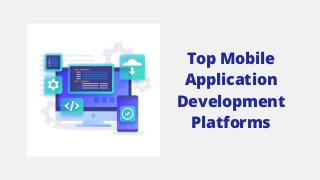Top Mobile Application Development Platforms
•
0 likes•3 views
Mobile application development is the process of creating specific software applications that run on a mobile device and utilize a network connection to work with remote computing resources.
Report
Share
Report
Share
Download to read offline

Recommended
Recommended
More Related Content
More from RosemaryGeorge6
More from RosemaryGeorge6 (14)
Tech Stacks That Reign Software Development in 2023

Tech Stacks That Reign Software Development in 2023
Top Mobile Application Development Platforms
- 2. Android The biggest advantage of Android OS is that its source code can be downloaded, customized, and distributed by anyone at no cost. The Android OS supports running multiple apps simultaneously on a single mobile device and offers immense flexibility to customize the UI during development to get the desired outcomes. iOS Unlike the Android OS, which can run on numerous hardware brands, an iOS operating system is a proprietary software that runs only on Apple’s devices, such as iPhones or iPad. Developers can leverage the iOS Software Development Kit (SDK) to create mobile apps for Apple devices and distribute the apps through the App Store maintained by Apple Inc.
- 3. Hybrid As the name suggests, a hybrid mobile application blends native and web programming capabilities within a single application. It allows developers to build applications for multiple operating systems on a single platform. A hybrid application is written using web technologies – HTML, CSS, and JavaScript – and then the code is embedded into a native application wrapper, which gives it the power of a truly native application that can work efficiently on any native platform.
- 4. Mobile application development is the process of creating specific software applications that run on a mobile device (such as applications for smartphones and digital assistants), and utilize a network connection to work with remote computing resources. The development process involves creating installable software bundles, implementing backend services, and testing the application on target devices. In short, mobile app development is the strategic process of designing, building, and launching a mobile app successfully. A detailed mobile app development guide includes the development process, approaches, platforms, cost of development, and tips to avoid failures and attain success with mobile app development.